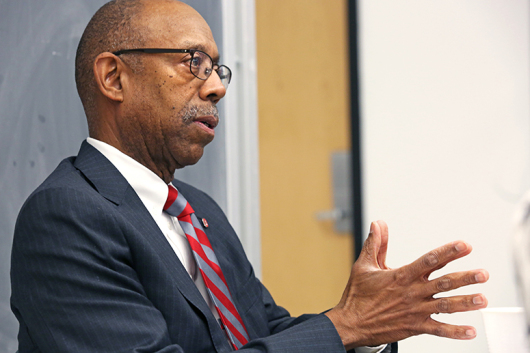
President Michael Drake speaks to the Lantern staff during a Jan. 26 interview.
Credit: Jon McAllister / Asst. photo editor
Ohio State President Michael Drake has had a son and a nephew compete in collegiate athletics, and said he doesn’t support the idea of pay-for-play for college athletes.
“I think the professional athletics are one thing, and the collegiate athletics are another,” Drake said during a Monday interview with The Lantern. “And I really support a collegiate model.”
Under current NCAA rules, schools can provide student-athletes with their full cost of attendance, but athletes don’t receive a salary or additional pay from the school. They are also prohibited from receiving compensation for anything related to their participation in athletics, including signing autographs or selling memorabilia.
In August, the O’Bannon v. NCAA trial resulted in a ruling that said schools could not prohibit student athletes from earning a portion of the revenue from using a player’s likeness by, for example, selling their jerseys or pictures.
Drake, who is a former member of the NCAA Division I Board of Directors, said he believes in “supporting players reasonably,” but added that the current setup makes sense.
“I believe there is a special value in the collegiate model and it’s important for us to maintain that,” he said. “The professional sports world is there, and that’s one thing and that’s great.”
Drake’s nephew, Asa Jackson, is a cornerback for the Baltimore Ravens in the NFL, which Drake said has shown him how professional athletics work in comparison to the NCAA.
“I know that world, and then we have the collegiate world, and I believe that the two support each other in many ways, but are separate,” he said.
OSU currently provides scholarship athletes with the full cost of attendance, and rules that would allow players to earn more compensation haven’t yet been enacted.
Drake’s comments line up with those given by athletic director and vice president Gene Smith during a July interview with The Lantern, when Smith said he’s against an “employer-employee relationship” between OSU and student athletes, and added that such a relationship could be detrimental to non-revenue programs.
“I hope that we don’t get to that point,” Smith said. “If we do, then the men’s volleyball teams of the world, and the gymnastics teams and all those teams — sayonara.”
While Drake and Smith have taken stances against pay-for-play, OSU men’s basketball coach Thad Matta told The Lantern during an October interview that he could see the merit of further compensation.
“Now, they (student athletes) are given a lot, don’t get me wrong on that,” Matta said. “But I think from the standpoint of trying to help these guys out a little bit, I’m all for it.”


